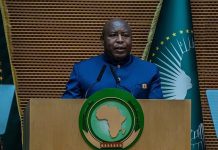Africa-Press – Mauritius. It has become a boring rite in March every year. The chief audit executive files his report on the government’s accounts for the previous fiscal year with revelations of waste of public funds, alleged fraud, shortcomings in tenders and other abuse of process.
The press gives wide coverage to the financial irregularities noted in the report. The Opposition is squealing like a skunk. The government clumsily denies this if it does not maintain radio silence. And the page is turned on the next report a year from now.
This year, the coronavirus pandemic very quickly chased the revelations of the National Audit Office from the headlines, to the hidden satisfaction of all those who feared indiscreet questions about their direct responsibility in this deplorable situation.
Everyone is arguably more concerned about the economic ravages of the coronavirus pandemic than about the waste of public funds. After all, we said to ourselves, waste is not unheard of.
Over time, we got used to this annual exercise which rightly denounces the financial mismanagement in the public sector but is not followed by any concrete action on the part of the government to avoid a repetition of the ‘story. Annual deficits
It took the advent of the coronavirus pandemic, with its potential impact on economic growth, for the Government to demand that all ministries reduce their budgeted spending by 10% in the current fiscal year, which suggests that there is a lot of fat in the machinery of government.
However, the wastage of public funds shows the scale of a problem that seems insurmountable, namely the inability of the Government to establish rigorous financial discipline in the administration of expenditure programs.
Financial discipline is however the least of things to be implemented in a country which accumulates a budget deficit from year to year, which is financed by the debt of the State
In his report for the 2018-2019 fiscal year, the Chief Audit Executive underlines the government’s growing recourse to repayable loans to finance its expenditures.
In parliamentary democracies, national accounts define deficit as the excess of total expenditure over total income. The Mauritian state budget is unique in that it includes borrowing in total income, which minimizes the real deficit.
As the table below (taken from page 28 of the report) shows, the budget deficit for 2018-2019 was Rs 11.1 billion. However, the total revenues of the government include repayable loans of Rs 27.7 billion. If we exclude these loans from total income, the real deficit amounts to Rs 38.8 billion (27.7 plus 11.1).
Even if the deficit of Rs 11.1 billion is financed entirely by internal debt (treasury bills purchased locally), the fact remains that the total debt contracted to finance the total expenditure was Rs 38.8 billion.
Debt service (repayment of the principal amount and interest) cost Rs 28.1 billion in 2018-2019, or 20% of total expenditure. It is estimated that without the waste of funds in the various sectors where money has been poorly spent, at least Rs 5 billion could have been saved in the budget in 2018-2019.
Contrary to necessary financial discipline, there is a tendency to carelessness in the public sector which has normalized waste and other financial embezzlement to the challenge of all standards of good governance.
Instead of holding parties accountable, there is a perception that our outdated institutions and laws dispense them from any need for strict compliance with the rules, any budgetary rigor, and any accountability for their actions.
The structures that are in place to manage, monitor and control spending programs are not functioning effectively to ensure that public money is spent wisely.
These management, monitoring and control structures are supposed to ensure an optimal level of effectiveness, efficiency and economy in spending programs. Let’s see what they do. (1) The management structure
Each ministry or parapublic body has accountants (accounting officers) who are responsible for ensuring that expenditure is carried out according to the procedures and according to the objectives for which the budgetary allocations have been voted.
If public money is underused, overused or wasted simply through lack of care or attention, automatic safeguards in the system should intervene (such as red flashing lights on a dashboard) to notify responsible that they are on the wrong track.
If things don’t go as planned, the accountant should be held accountable. In principle, the head of the ministry has the ultimate responsibility for being accountable for the use of public funds.
Modern public sector regulation requires that each ministry have a financial controller who is in charge of all financial aspects of the spending program with the authority to answer for the merits of any amount spent.
(2) The supervisory structure (internal audit)
The role of Internal Audit is to examine and assess internal control over expenditure in order to detect flaws in the system and propose solutions to remedy them. The Government has an army of internal auditors who are posted to the various ministries on a rotating basis.
These auditors are supposed to put in place a conceptual framework of the risks of errors and irregularities inherent in each expenditure program (risk assessment framework) in order to warn accountants of the risks of default and of the measures to be taken to mitigate them.
Given the frequency of financial irregularities in some ministries, it is clear that internal expenditure controls are dysfunctional. Internal Audit should review its copy and ensure that its advisory function is up to the task.
Internal Audit is supposed to prevent irregularities before the National Audit Office steps in to examine the situation and make its findings. (3) The parliamentary oversight structure
The Public Accounts Committee (PAC) is a committee of the National Assembly, made up of members of the government and the opposition, with the role of reviewing government spending.
He is a watchdog just like the Chief Audit Executive. For some time now, we have not heard about the work of the PAC or its recommendations to the government. The Government should give the PAC the necessary resources so that it can do its work in complete freedom.
The PAC should summon the relevant officials to appear before it to explain the breaches of duties and procedures that are revealed in the report of the Chief Audit Executive.
The PAC should go further by calling for a broad debate in parliament on the report of the Chief Audit Executive. This debate would give the responsible ministers the opportunity to explain themselves on the affairs of their ministry.
Follow-up of Audit recommendations The National Audit Office is an independent body which fulfills its role effectively, but unfortunately the nature of its function requires it to review government accounts after expenditure has been made in a previous year.
The ex post report of the Chief Audit Executive only shows the damage. At best, it can only recommend measures to prevent the repetition of irregular or fraudulent acts in the future.
This is where the PAC should step in to demand that the Government: (a) follow up on the recommendations of the Chief Audit Executive to remedy any systemic flaws that have been exposed and to punish breaches of the law;
(b) establish reliable internal control mechanisms to prevent irregularities and other financial embezzlement;
(c) allow an independent assessment of the effectiveness of internal controls;
(d) amend the law in order to introduce criminal sanctions against civil servants guilty of breach of their duties and obligations.
In March 2019, the government set up a committee in consultation with ministries / departments to address the weaknesses and gaps identified by the Audit Office in its report for the 2017-2018 fiscal year.
To date, we have heard nothing of the work of this committee. It seems to have had the same fate as the “task force” established to follow up on the recommendations of the Commission of Inquiry into Drugs.
We don’t see anything coming from these committees. By sounding the alarm bells on shady business every year, the Chief Audit Executive’s report scandalized public opinion for a time and then fell into oblivion. And come what may !
For More News And Analysis About Mauritius Follow Africa-Press







